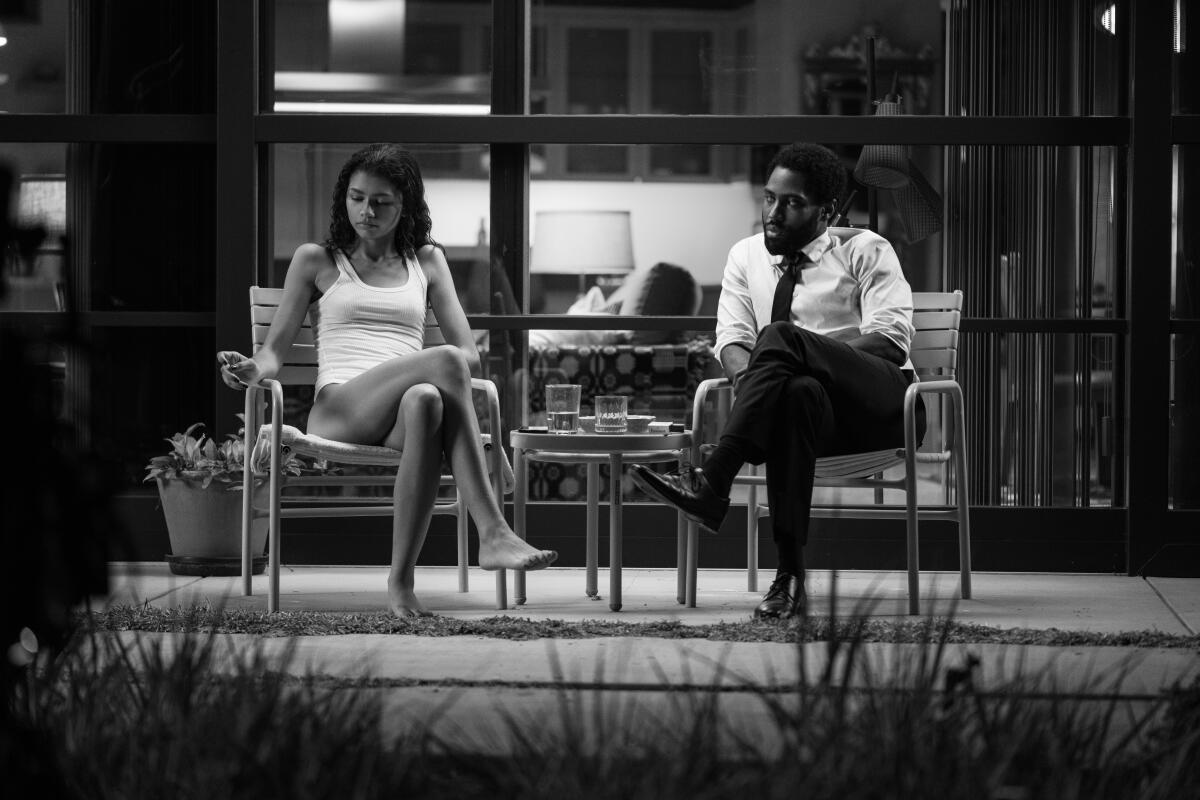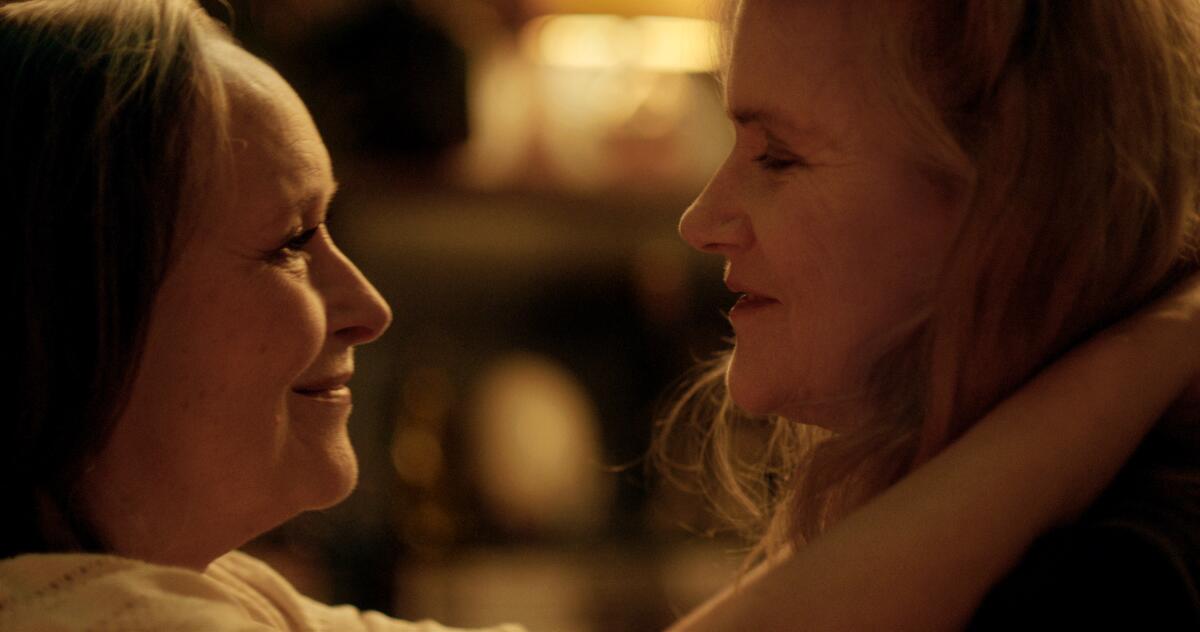Indie Focus: Coupledom and criticism in ‘Malcolm & Marie’
Hello! I’m Mark Olsen. Welcome to another edition of your regular field guide to a world of Only Good Movies.
Only good movies
Get the Indie Focus newsletter, Mark Olsen's weekly guide to the world of cinema.
You may occasionally receive promotional content from the Los Angeles Times.
The mostly virtual Sundance Film Festival ended earlier in the week, shorter and smaller than usual but rather an unexpected success. Siân Heder’s “CODA” won the grand jury prize, audience award and two other jury awards in the U.S. dramatic competition and sold to Apple TV+ for a record-setting $25 million. Ahmir “Questlove” Thompson’s “Summer of Soul” won the grand jury and audience awards in the U.S. documentary competition and sold to Searchlight Pictures and Hulu for more than $12 million, setting a record for a documentary sale. Rebecca Hall’s “Passing” sold to Netflix for around $15 million.
Justin Chang, Jen Yamato and I exchanged notes on what we took from the experience of the virtual festival. The format, as Jen wrote, “forced a necessary reset. No being shut out of oversold screenings, no freezing in the cold waiting for shuttles, no irritating chatterboxes broadcasting spoiler-y opinions in the lobby after the first screening of a hot-ticket title. (I’d say no influencers crowding into branded lounges but there were enterprising companies that managed to dole out swag — even at a virtual festival.) The fact that geography and access were not as limiting factors this year feels like a welcome democratization for festival culture in general, one I’ll be curious to see bear out as we move forward into the future.”
The nominations for both the Golden Globes and the SAG Awards were announced this week, finally bringing this very unusual awards season into sharper focus.
As Glenn Whipp wrote of the Globes noms, “For Hollywood, Globes are about marketing. The [Hollywood Foreign Press Assn.]’s timing is impeccable, even if the behavior of its members isn’t. In normal times, movie studios and streamers piggyback off the nominations to promote their Oscar contenders playing in theaters, while their television counterparts hope their new programs will get a publicity boost that can carry them through the Emmys. In other words: The Golden Globes are important because, in the awards season ecosystem of publicity, personal resume-building and ego gratification, they have been deemed important by a not-so-secret-handshake agreement.”
But the SAG Awards nominations, Glenn wrote, offered “in some cases a necessary corrective to the strange Golden Globes slate that came a day before (no mention of ‘The Prom’ or ‘Music’ here). ‘Da 5 Bloods,’ ‘Ma Rainey’s Black Bottom’ and ‘One Night in Miami,’ Black-led movies that failed to make the motion picture drama cut at the Globes, were all nominated for SAG’s film ensemble award, as was ‘Minari,’ the excellent immigrant drama that picked up just one Globe nomination. Of course, SAG Awards voters also gave ‘Hillbilly Elegy’ two nominations (Amy Adams and Glenn Close), so the choices weren’t beyond reproach, though you could make the case that voters simply wanted to salute these great women for trying their best under difficult circumstances.” (Sign up for the Envelope newsletter for more awards commentary from Glenn every week, plus highlights from our podcast.)
As we were finishing this week’s newsletter, news broke that actor Christopher Plummer has died at age 91. Though still best known for “The Sound of Music,” he had an astonishing run of roles late in life — including “All the Money in the World,” for which he was nominated for an Oscar, and “Knives Out.”
When he won an Oscar for supporting actor in “Beginners” at age 82 and at last held the statue, he said, “You’re only two years older than me, darling; where have you been all my life?”
Enjoying this newsletter? Consider subscribing to the Los Angeles Times
Your support helps us deliver the news that matters most. Become a subscriber.
‘Malcolm & Marie’
Written and directed by Sam Levinson under pandemic restrictions, “Malcolm & Marie” stars John David Washington and Zendaya as a couple having an extended argument after returning home after a night out. He is a filmmaker who just launched his debut feature; she is his partner, support and inspiration. And he forgot to thank her at the premiere. The film is streaming now on Netflix.
For The Times, Justin Chang wrote, “One of the big questions in ‘Malcolm & Marie,’ an attractively photographed shouting match written and directed by Sam Levinson, is whether or not we can divine a filmmaker’s motives from their work. … But as the (sometimes literal) knives come out and dueling views about love, cinema, race and gender take center stage, we are invited to continually adjust our sympathies and to ponder which character most closely aligns with Levinson’s own point of view.”
Mary McNamara dug into the movie’s seeming criticisms of the work of criticism, as well as its odd obsession with a “white lady critic from the Los Angeles Times.” As Mary wrote, “A key theme of the film is the exploration of intrinsic bias — the idea that the work of a Black man cannot be understood clearly by a white woman who, according to Malcolm, is so busy trying to measure his intent (and to follow her own woke agenda by placing him on a hierarchy of Black directors) that she can’t see the film as a film. … Within the universe of the film, Malcolm’s fixation on this particular critic reveals his insecurity and contradictory beliefs more than anything else. But its highly insulting tone, and at times startlingly precise echo of overused and subtexted phrases, got many critics’ attention.”
Reviewing the film for The Playlist, Robert Daniels wrote, “Levinson, committing the gravest mistake, shifts ‘Malcolm & Marie’ from a character-driven romance to a thought experiment. He gleefully skips into the rabbit hole of Malcolm’s shallow, narcissistic artistic soul, often leaving Marie to giggle in delight. … The cinematography, R&B-infused soundtrack, and the salient points regarding how Black art is consumed and judged hit home. But his picture is also a bleak and repetitive 100-minute black-and-white film school homework assignment. A film made for cinephiles and industry folks, but maybe not for your next date night.”
For the New Yorker, Richard Brody wrote, “It’s a movie about moviemaking, but it’s one of a diabolical vanity, in which Levinson, who’s white, creates a Black filmmaker-character as his stand-in and his mouthpiece, an artistic hero whose character and practice he then undercuts and whose ideas he subjects to critique, just enough to enact the cinematic equivalent of a media troll’s faux-innocent maneuver: He’s just raising questions.”
For Elle, Candice Frederick wrote, “‘Malcolm & Marie’ isn’t so much a story of love as it is a prototype of a stubbornly imbalanced and toxic relationship. It’s just that now, both parties know it. As much a sexual object to Malcolm as Levinson’s lens makes her to the audience, Marie would be reduced to a trinket if it weren’t for Zendaya’s thoughtful interpretation of the script. … With its terrific performances, resonating dialogue, and elegant single-setting production, the film compels us to see beyond a couple clamoring across the house and acknowledge that a perpetually underestimated woman has found her voice.”
For the Undefeated, Soraya Nadia McDonald wrote about how to read Levinson into the material, noting,“’Malcolm & Marie’ doesn’t accomplish much besides telling on its progenitor, though — it certainly does not engender sympathy. … The fact that Levinson, who is white, has decided to deploy Washington, who is Black, as a shield for his rhetorical bomb-throwing inspires enough eye-rolling to power a household appliance. Which is to say, in Netflix’s streaming Dewey Decimal System, Levinson’s film ought to be grouped with Noah Baumbach’s ‘Marriage Story’ and Kenya Barris’ ’#blackAF.’ Surely there are therapists in Los Angeles equipped to deal with this particular flavor of patients and stop them from foisting upon us these pretentious diatribes about how no one understands them or their art.”

‘Little Fish’
Directed by Chad Hartigan from a screenplay by Mattson Tomlin, “Little Fish” tells a pandemic story that was conceived of before our actual pandemic. In the film, Emma (Olivia Cooke) and Jude (Jack O’Connell) struggle to hold onto their relationship in the face of a virus that erases people’s memories. The film is at local drive-ins, in limited theatrical release and on VOD.
For The Times, Katie Walsh wrote, “Hartigan has a knack for sensitive, human dramas, and although ‘Little Fish’ takes place in a near-future heightened reality, the story is relatable not only because we’re all living through a pandemic ourselves — dealing with grief and loss on a scale that ranges from the deeply personal to the impossibly large — but also because this kind of loss is very real. … The film eclipses its conceit, delicately examining both the unique pain that is the loss of intimacy and what makes us fall in love with someone again and again.”
For the New York Times, Kristen Yoonsoo Kim wrote, “What happens when one party has no recollection of the past that led to falling in love? And if memories shape one’s identity, what does it mean for Emma to continue loving someone who is no longer his original self? The answers are not all there, but the questions keep the film intriguing.”
For the Hollywood Reporter, John DeFore wrote, “We’ve seen this story before, of course, in the wrenching dementia dramas that let elderly actors remind us of their greatness. But without their nostalgic component and opportunity to examine regret, ‘Fish’ feels little like one of those. It’s also little like the sometimes treacly, sometimes tasteful illness romances often aimed at YA audiences.”

‘Two of Us’
Directed by Filippo Meneghetti, “Two of Us” is France’s submission this year for the Oscar for international feature. The film stars Barbara Sukowa and Martine Chevallier as two women who have long lived as neighbors but are actually lovers. Circumstances pull them apart from their longtime cozy existence. The movie is available in virtual cinemas.
For The Times, Robert Abele wrote, “You could watch a lot of classic love stories — the big, the small, sad, happy — and still not see something as uniquely heart-stopping and heartwarming as Italian filmmaker Filippo Meneghetti’s debut feature, ‘Two of Us.’ A septuagenarian lesbian romance set in a small French town and steered by a pair of can’t-look-away performances from Barbara Sukowa and Martine Chevallier, it’ll subvert all your notions of what late-in-life passion can look like on film, especially when threatened by lies, separation and time. In certain circumstances, this movie makes wrenchingly clear, being in love can even feel like being in a thriller.”
For the New York Times, Beatrice Loayza wrote, “Meneghetti and the cinematographer Aurélien Marra beautifully summon the ache of queer desire. Through the use of symbolic peepholes, eavesdropping and dark rooms that provide cover for whispered assurances of devotion, ‘Two of Us’ succeeds as a stealthy depiction of lesbian erotics, one that mirrors the inhibitions of a generation.”

Only good movies
Get the Indie Focus newsletter, Mark Olsen's weekly guide to the world of cinema.
You may occasionally receive promotional content from the Los Angeles Times.




